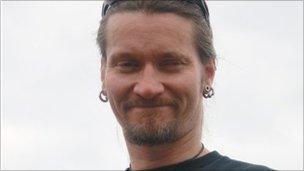Undercover police should get court approval: Acpo head
- Published

A trial collapsed when Mark Kennedy's cover was blown
Undercover policing operations should have to be authorised in advance by a judge, the head of the Association of Chief Police Officers has said.
Sir Hugh Orde told a seminar change was needed to restore public confidence.
It follows concerns about ex-Metropolitan Police constable Mark Kennedy, who spent seven years posing as an environmental activist.
The case was "rightly" subject of three separate reviews because something had "gone wrong", he added.
Speaking at a policing seminar held by human rights group Liberty in London, Sir Hugh said: "The current system of retrospective inspection is, in my judgment, no longer sufficient to secure the confidence of right thinking people that such interference with citizens' rights - with its foreseeable collateral intrusion on many - is appropriate."
He said undercover police should not have "carte blanche" and an "additional element of judicial oversight" would be in keeping with British traditions of accountability to the rule.
"We do not look for James Bond wannabes: There is no licence to thrill.
"The benefit would far outweigh the additional administrative burden," he said.
The National Public Order Intelligence Unit (NPOIU), to which undercover officer Mr Kennedy belonged, was formerly run by Acpo but its control transferred to Scotland Yard last month.
Liberty director Shami Chakrabarti said: "At last, one of the most important voices in British policing calls for greater legal restraint on intrusive surveillance.
"We agree with Sir Hugh that such an important service should be accountable not to politics but to the law."
Several inquiries
Mr Kennedy spent seven years under cover posing as an environmental activist known as Mark "Flash" Stone.
In January, six protesters accused of planning to invade Ratcliffe-on-Soar power station in Nottinghamshire claimed prosecutors dropped charges against them after Mr Kennedy offered to give evidence on their behalf.
Several inquiries - by Her Majesty's Inspectorate of Constabulary (HMIC), the Independent Police Complaints Commission (IPCC), the Serious and Organised Crime Agency (Soca) and Scotland Yard - are investigating aspects of undercover policing in the wake of the controversy.
Policing Minister Nick Herbert said after the case that it was clear "that something operationally has gone very wrong" and that in future Acpo should act as a professional body and not run undercover units itself.
- Published18 January 2011
- Published14 January 2011
- Published11 January 2011